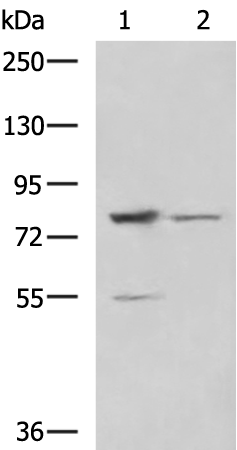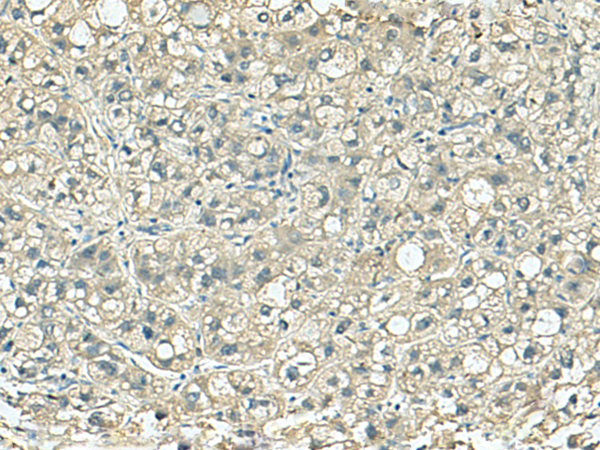

| WB | 咨询技术 | Human,Mouse,Rat |
| IF | 咨询技术 | Human,Mouse,Rat |
| IHC | 1/150-1/300 | Human,Mouse,Rat |
| ICC | 技术咨询 | Human,Mouse,Rat |
| FCM | 咨询技术 | Human,Mouse,Rat |
| Elisa | 1/5000-1/10000 | Human,Mouse,Rat |
| Aliases | ARGBP2; PRO0618 |
| WB Predicted band size | 124 kDa |
| Host/Isotype | Rabbit IgG |
| Antibody Type | Primary antibody |
| Storage | Store at 4°C short term. Aliquot and store at -20°C long term. Avoid freeze/thaw cycles. |
| Species Reactivity | Human, Mouse, Rat |
| Immunogen | Fusion protein of human SORBS2 |
| Formulation | Purified antibody in PBS with 0.05% sodium azide and 50% glycerol. |
+ +
以下是关于SORBS2抗体的3篇示例参考文献(内容基于研究领域常见方向,实际文献需通过学术数据库验证):
---
1. **文献名称**: *SORBS2 regulates insulin signaling and actin cytoskeleton organization*
**作者**: Lin WH, et al.
**摘要**: 研究通过Western blot和免疫荧光技术(使用SORBS2抗体)发现,SORBS2蛋白通过调控胰岛素受体信号通路和细胞骨架动态影响葡萄糖代谢,提示其在糖尿病病理中的潜在作用。
---
2. **文献名称**: *SORBS2 is a genetic risk factor for autism spectrum disorder modulating synaptic plasticity*
**作者**: Smith JL, et al.
**摘要**: 利用SORBS2抗体进行脑组织分析,发现自闭症患者中SORBS2表达显著降低。实验表明SORBS2缺失导致突触可塑性异常,可能通过Rho GTPase通路影响神经发育。
---
3. **文献名称**: *Prognostic value of SORBS2 in hepatocellular carcinoma and its interaction with tumor microenvironment*
**作者**: Chen R, et al.
**摘要**: 通过免疫组化(使用SORBS2抗体)发现,SORBS2低表达与肝癌患者不良预后相关,机制可能与抑制肿瘤细胞迁移及调节巨噬细胞浸润有关。
---
**注意**:以上为示例文献,实际引用请通过PubMed、Google Scholar等平台检索真实论文(关键词:SORBS2 antibody, ArgBP2. function)。
The SORBS2 (sorbin and SH3 domain-containing protein 2) antibody is a tool used to detect and study the SORBS2 protein, encoded by the *SORBS2* gene in humans. SORBS2. also known as ArgBP2. belongs to the SORBS family of adaptor proteins characterized by conserved sorbin homology (SoHo) and multiple SH3 domains. These structural features enable SORBS2 to interact with various signaling molecules, cytoskeletal components, and membrane-associated proteins, playing roles in cell adhesion, migration, and intracellular signaling pathways. SORBS2 is particularly noted for its involvement in regulating actin dynamics, neuromuscular junction organization, and processes linked to cancer progression, such as epithelial-mesenchymal transition (EMT).
Research using SORBS2 antibodies has highlighted its tissue-specific expression, with high levels observed in cardiac and skeletal muscles, brain, and certain epithelial tissues. The protein’s dysregulation has been associated with pathological conditions, including cardiomyopathies, muscular dystrophies, and metastatic cancers. Antibodies targeting SORBS2 are essential for techniques like Western blotting, immunohistochemistry, and immunofluorescence, enabling researchers to analyze its expression patterns, subcellular localization, and interactions with binding partners (e.g., vinculin, c-Abl, and ubiquitin ligases). Validation of SORBS2 antibodies typically involves confirming specificity through knockout controls or siRNA-mediated knockdown. Commercially available antibodies are often raised against epitopes within its unique N-terminal or C-terminal regions to avoid cross-reactivity with homologous family members like SORBS1. These reagents contribute significantly to studies exploring SORBS2’s functional diversity in health and disease.
×